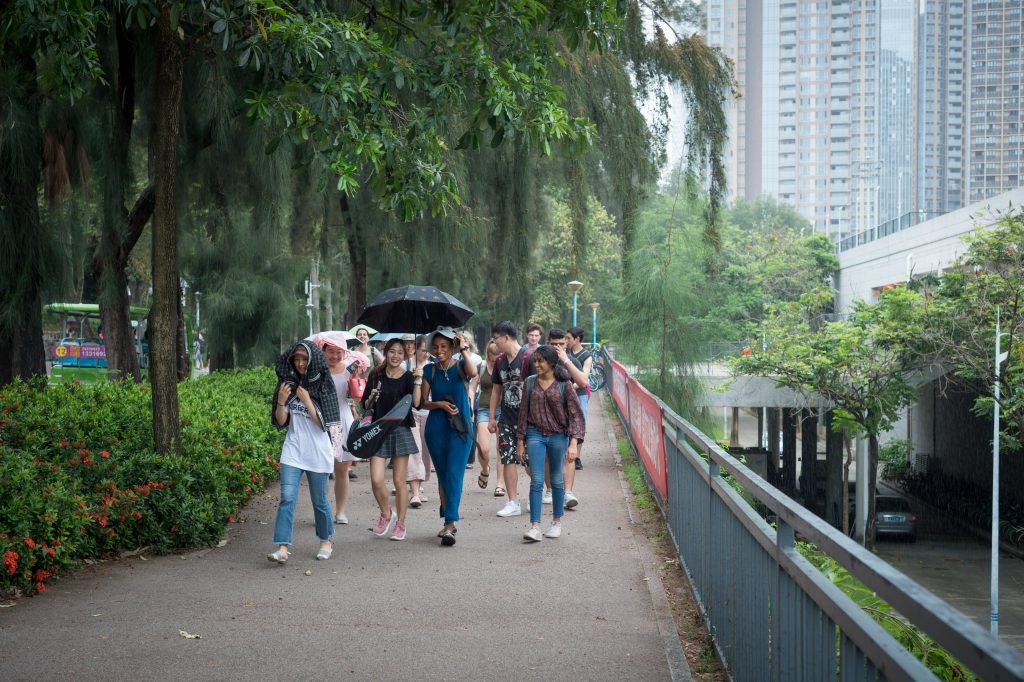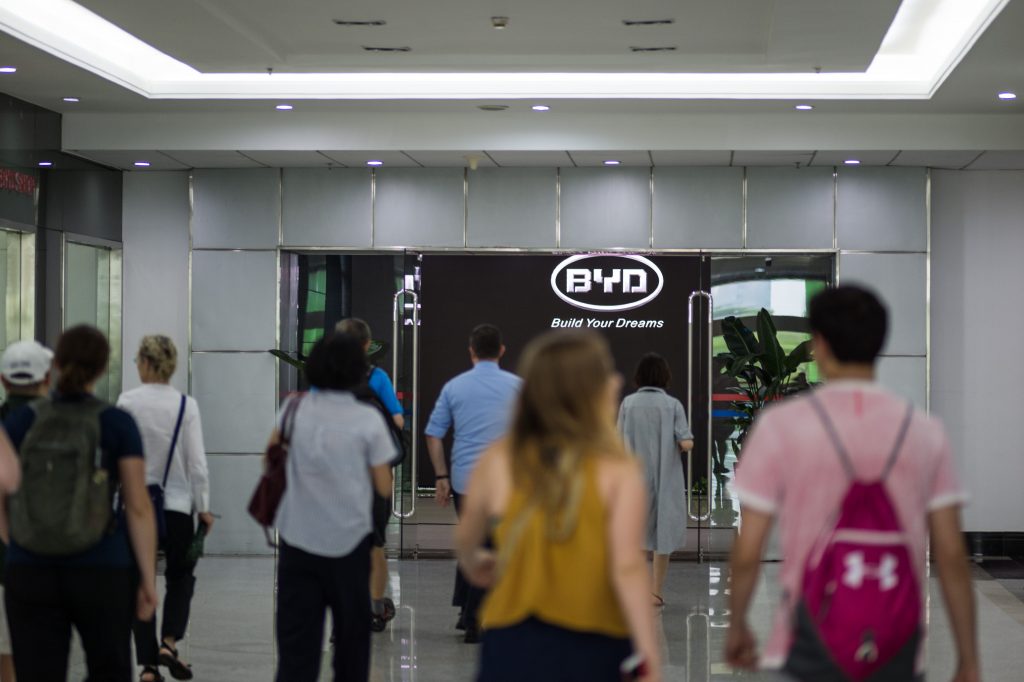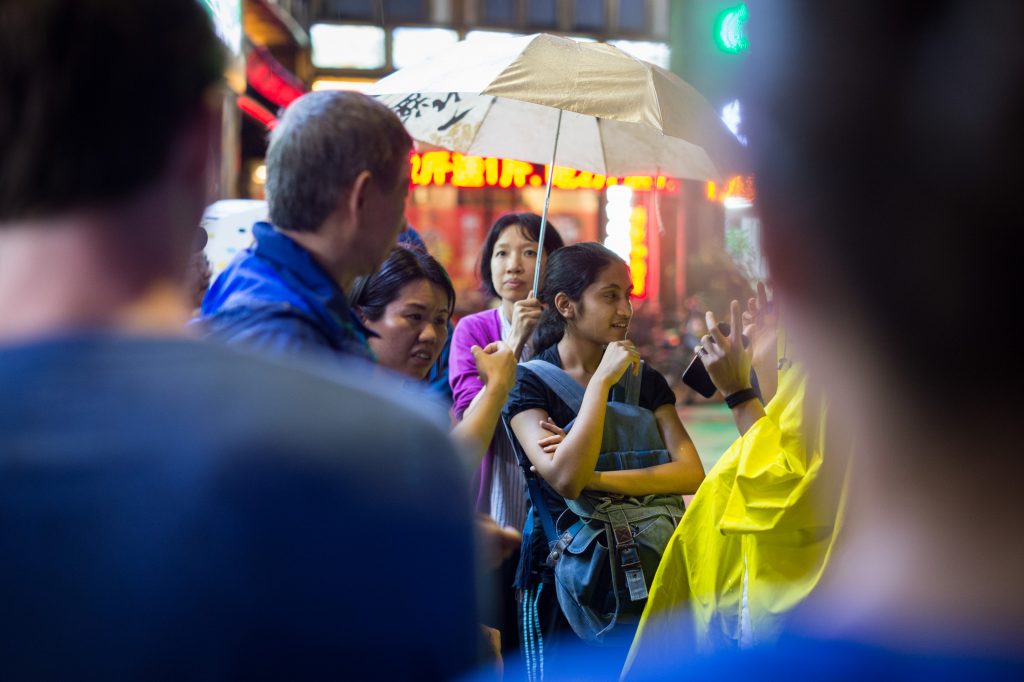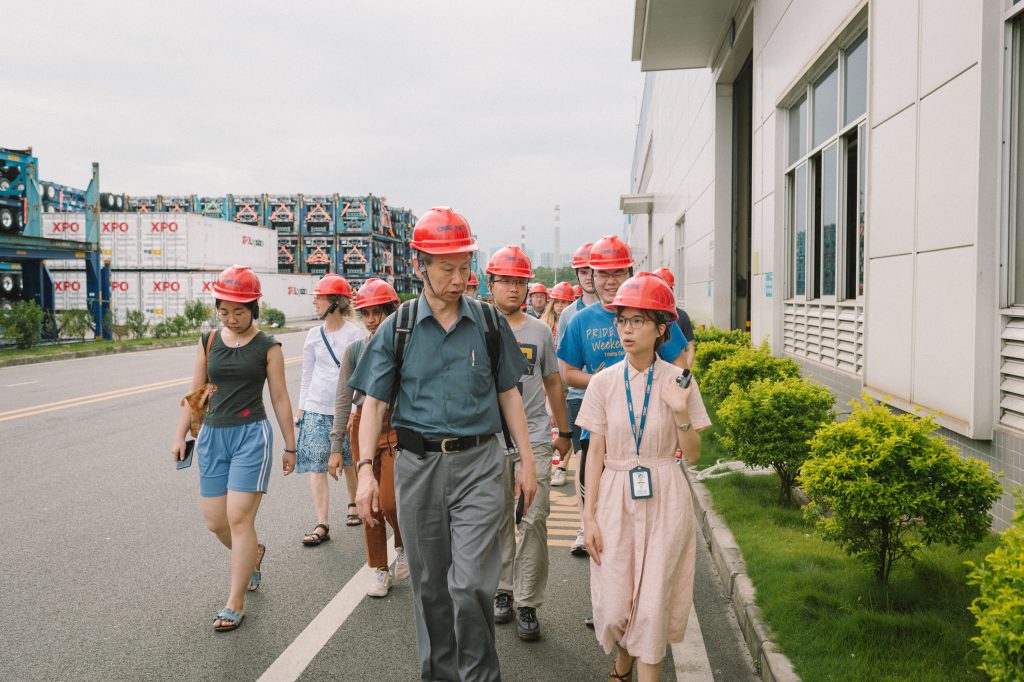To view more photos from the trip, click here.
The Center for Urban and Global Studies (CUGS) at Trinity College took 14 students on a field study course to the Pearl River Delta in June. This was the 11th year the Center has taken students to China and surrounding countries to study cities. The course themes were urbanization, innovation, and migration in the cities of Shenzhen, Dongguan, Huizhou, and Hong Kong.
Brielle Jones ’20 noted that, “The dense title is reflective of the itinerary for the trip, packed with visits to tech parks, manufacturing companies, campus lectures, city ventures and much more.”
The group of students represented six countries, including four students from China, students from Uganda, Guatemala, Egypt, and India, and six American students. The group comprised students from diverse majors as well, including urban studies, engineering, economics, human rights, sociology, international studies, math, political science, psychology, and music. Solidifying the interdisciplinary strength of the course, the program’s faculty included Dean Xiangming Chen, Paul E. Raether Distinguished Professor of Global Urban Studies and Sociology; Yipeng Shen, Associate Professor of Language and Culture Studies and International Studies; Beth Notar, Associate Professor of Anthropology; and Garth Myers, Paul E. Raether Distinguished Professor of Urban International Studies. Gabby Nelson of CUGS served as the teaching assistant.
The program kicked off in Shenzhen, which has grown from a town of around 100,000 to an innovative city of over 20 million since its designation as China’s first Special Economic Zone in 1979. The School of Architecture and Urban Planning on the beautiful Shenzhen University campus served as the trip’s academic base. Three Shenzhen University professors gave lectures to the class: Professor Zhang Yuxing gave a lecture titled “From Land Economics to Spatial Economics: The Pathway and Direction of Shenzhen’s Urban Innovation” and Professor Yang Xiaochun gave a lecture titled “Border Crossing and Integration: The Old Narrative and New Thinking on Land Crossings between Guangdong, Hong Kong, and Macao.” Professor Li Leile’s lectured focused on the transition of urban villages in Shenzhen.
The group also had the chance to join an urban planning class to hear about student research on affordable housing in urban villages, while Professors Shen and Notar talked about their own research as it relates to urban issues. Later that same day, students toured Baishizhou urban village, the largest of Shenzhen’s urban villages, observing firsthand the crossroads in which urban villages in Shenzhen are located. While Baishizhou urban village is a vibrant, close-knit community that provides much needed affordable housing the city, it is located in a desirable area next to Shenzhen high-tech district where developers are seeking to build modern high rises and office buildings. The conflict between the interests of migrants and the continued upgrading of the city emerged as an important theme of the course.
Prior to departing for China, the class read about the contagious drive for innovation that powers Shenzhen, which is known as China’s Silicon Valley. While in Shenzhen, this drive was palpable. At nearly every site visit in Shenzhen, innovation was at the forefront of company thinking. Nowhere was this more evident than at the headquarters of BYD, China’s largest electric carmaker. BYD has been innovating since its founding as a maker of rechargeable batteries in 1995. It entered the compact car market in 2005, premiered its Sky Rail line in 2017, and launched its new dynasty series of cars in recent years. Shenzhen recently used BYD vehicles to electrify its entire fleet of buses and taxis, making it the first city in the world to do so. BYD has also sold its electric buses in the United States, Europe, and Latin America.
Elizabeth Zheng ’22, a native of Shenzhen, enjoyed the visit to BYD and said that, “In terms of the places we went to visit during our trip, I think it was no doubt such a great opportunity for me since I have never visited the places even though I live in this city.”
Dongguan, by contrast, is a city most known for manufacturing, though its traditional manufacturing base is starting to decline. The class heard from city officials about efforts to upgrade the city, especially in the area of environmental protection. The class was warmly welcomed to Dongguan, Hartford’s sister city, with a lunch with municipal government officials. A dragon boat team from Dongguan will travel to Hartford in August to compete in the Riverfront Dragon Boat and Asian Festival and a delegation of senior officials from Dongguan will visit in September to meet with Mayor Luke Bronin to discuss further cooperation between the two cities.
While in Dongguan, the class visited a shoe factory, clothing factory, and trailer chassis factory. Professor Beth Notar used Leslie Cheng’s book Factory Girls to help students understand the lives of migrant workers in Dongguan while Dean Xiangming Chen helped students to compare and contrast how Dongguan has changed in the decade since Cheng did her research in the mid-2000s.
Huizhou University graciously welcomed Trinity’s delegation with a lecture, discussions with students, dinner, and personal student tour guides from the tourism management department, who practiced their English and guide skills while guiding the group over two days. Site visits in Huizhou included tours of the Old Town and a factor of TCL, one of the largest TV and electronics companies in China.
After hearing about the increasingly open border between Guangdong Province and Hong Kong from Professor Yang at Shenzhen University earlier in the trip, the group traveled to Hong Kong over the new Hong Kong-Zhuhai-Macao Bridge, the longest bridge in the world stretching 34 miles. Guided by Ms. Li Na, mother of Alex Chu ’22, a senior engineering manager involved in the project, students visited the bridge’s command center before crossing.
In Hong Kong, Professor Yipeng Shen introduced students to the film Chungking Express to encourage the class to think about life in the city through a cultural lens. The class visited the vibrant, boisterous Chungking Mansions to tactilely experience the space and feelings conveyed in the film. Visits to Hong Kong Polytech University and The Chinese University of Hong Kong not only allowed students to hear faculty presentations about Hong Kong’s position and role in the Great Bay Area but also got them thinking about attending graduate programs there.
Throughout the trip, the class met up with and were kindly hosted by a handful of Trinity alumni and parents. In Shenzhen, Lydia Chen ’18 hosted the group at the Sam’s Club headquarters, where she works as a buyer of toys for the Chinese market. In Dongguan, the parents of Sam Zhou ’19 and Denny Chen ’20 held dinners for the class. In Huizhou, the mother of Jiayi Huang ’17 brought the group to a piano concert at the Huizhou Culture and Arts Center, where she is Executive Director. The trip concluded with a dinner in Hong Kong hosted by Trustee Adrian Lo ’12.
Trinity has greatly expanded its connections to China in recent years. In addition to the summer program, which serves as a cornerstone of the newly launched minor in urban China studies, there has been a large increase in the number of Chinese students attending Trinity, teaching opportunities for visiting scholars from both Trinity and China, and a semester study away program in Shanghai via a partnership with Fudan University, one of China’s top-ranked universities.
The new summer program in southern China in 2019 was generously supported by the Thomas Urban China Teaching and Research Endowment.






